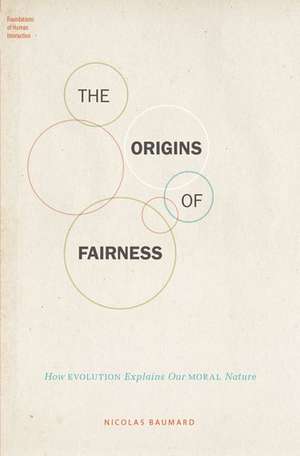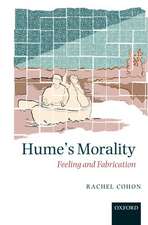The Origins of Fairness: How Evolution Explains Our Moral Nature: Foundations of Human Interaction
Autor Nicolas Baumarden Limba Engleză Hardback – 14 apr 2016
Din seria Foundations of Human Interaction
- 23%
 Preț: 704.69 lei
Preț: 704.69 lei - 25%
 Preț: 509.52 lei
Preț: 509.52 lei - 6%
 Preț: 229.37 lei
Preț: 229.37 lei - 12%
 Preț: 299.68 lei
Preț: 299.68 lei - 12%
 Preț: 498.99 lei
Preț: 498.99 lei - 30%
 Preț: 612.64 lei
Preț: 612.64 lei - 30%
 Preț: 551.68 lei
Preț: 551.68 lei - 26%
 Preț: 613.05 lei
Preț: 613.05 lei - 13%
 Preț: 342.88 lei
Preț: 342.88 lei - 25%
 Preț: 592.17 lei
Preț: 592.17 lei - 22%
 Preț: 344.98 lei
Preț: 344.98 lei - 30%
 Preț: 761.21 lei
Preț: 761.21 lei - 50%
 Preț: 575.16 lei
Preț: 575.16 lei - 12%
 Preț: 313.27 lei
Preț: 313.27 lei - 13%
 Preț: 338.03 lei
Preț: 338.03 lei - 25%
 Preț: 537.81 lei
Preț: 537.81 lei - 13%
 Preț: 513.60 lei
Preț: 513.60 lei
Preț: 551.25 lei
Preț vechi: 790.50 lei
-30% Nou
Puncte Express: 827
Preț estimativ în valută:
105.48€ • 110.43$ • 87.28£
105.48€ • 110.43$ • 87.28£
Carte tipărită la comandă
Livrare economică 26 martie-01 aprilie
Preluare comenzi: 021 569.72.76
Specificații
ISBN-13: 9780190210229
ISBN-10: 0190210222
Pagini: 270
Dimensiuni: 157 x 236 x 31 mm
Greutate: 0.5 kg
Editura: Oxford University Press
Colecția OUP USA
Seria Foundations of Human Interaction
Locul publicării:New York, United States
ISBN-10: 0190210222
Pagini: 270
Dimensiuni: 157 x 236 x 31 mm
Greutate: 0.5 kg
Editura: Oxford University Press
Colecția OUP USA
Seria Foundations of Human Interaction
Locul publicării:New York, United States
Recenzii
This book offers a compelling account of the origins of morality. It makes an important contribution to the growing body of literature in the field of evolutionary ethics ... and will be of interest to anyone in the fields of evolutionary ethics and contractualism, as well as to students of ethics broadly construed.
readers interested in contractualist normative theory might benefit from his exposition of the theory in the light of evolutionary theory. Baumard writes without using many technicalities and so the book should be accessible for the non-specialist reader, too.
readers interested in contractualist normative theory might benefit from his exposition of the theory in the light of evolutionary theory. Baumard writes without using many technicalities and so the book should be accessible for the non-specialist reader, too.
Notă biografică
Nicolas Baumard is Research Scholar in the Department of Cognitive Sciences at the Ecole Normale Supérieure in Paris.










